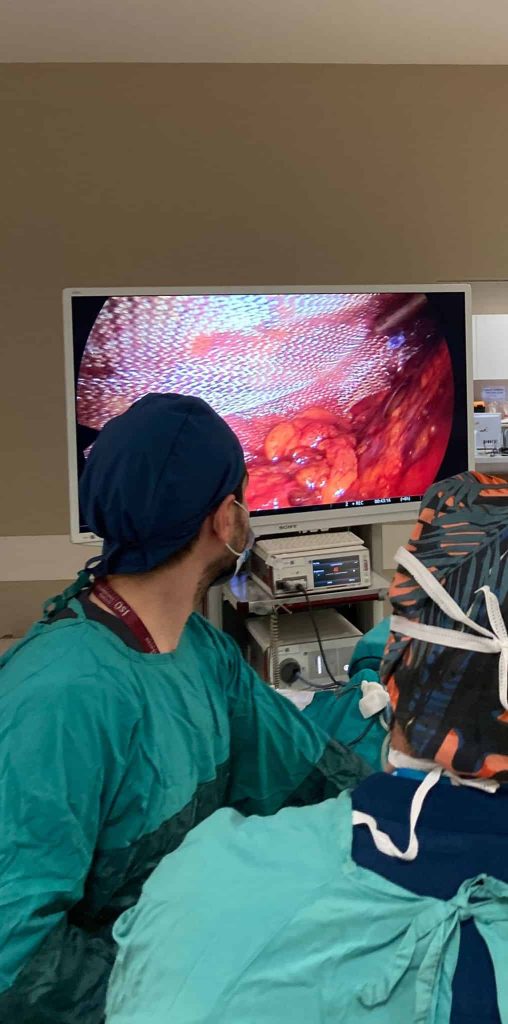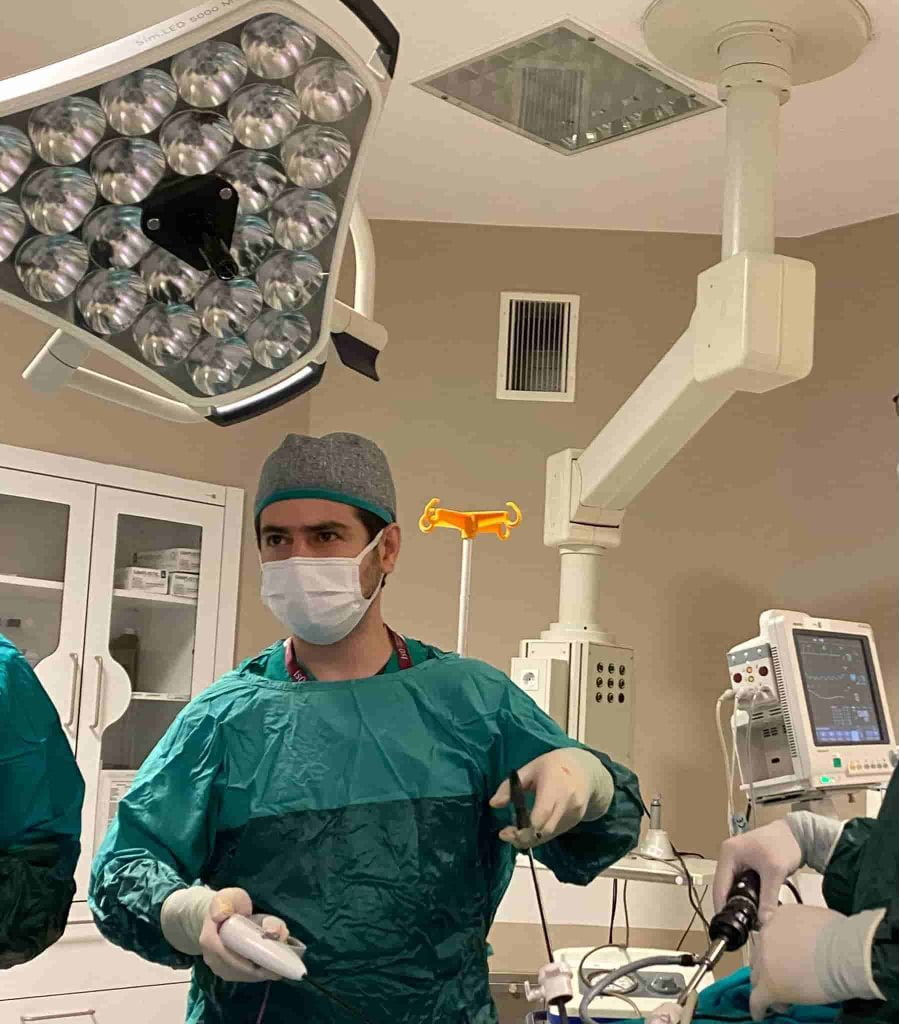Are you interested in sleeve gastrectomy and would like to find out more? In this blog post, we will provide you with all the important information about sleeve gastrectomy. From the procedure of a sleeve gastrectomy to the long-term consequences and costs – we will answer all your questions. So if you’re wondering what a gastric sleeve is, which vitamins are important after surgery or whether a gastric bypass might be a better option for you, then you’ve come to the right place. Read on to find out everything you need to know about gastric sleeve surgery.

Long-term consequences of sleeve gastrectomy
Sleeve gastrectomy, also known as vertical gastroplasty or sleeve gastrectomy, is a weight loss surgery. It is an irreversible operation in which part of the stomach is removed to create a smaller stomach volume. Although sleeve gastrectomy has many benefits, such as significant weight loss and improvement of obesity-related health problems, there are also some potential long-term consequences that you should be aware of.
Malnutrition
After gastric sleeve surgery, food intake is severely restricted, which can lead to an increased risk of malnutrition. Due to the smaller stomach volume, you can only eat small portions and may not absorb enough nutrients. It is important to follow your doctor’s dietary recommendations and, if necessary, take nutritional supplements to prevent deficiency symptoms.
Dumping syndrome:
Dumping syndrome is a common complication after gastric sleeve surgery. It occurs when food passes too quickly from the stomach into the intestine. Symptoms can include nausea, vomiting, diarrhea, dizziness and weakness. To avoid dumping syndrome, you should eat slowly, eat small meals and avoid sugary or highly processed foods.
Reflux diseases
Some patients develop gastroesophageal reflux after gastric sleeve surgery, in which stomach acid rises into the esophagus. This can lead to heartburn, acid regurgitation and chest pain. To avoid reflux disorders, you should chew your food slowly and thoroughly, avoid fatty and acidic foods and do not lie down for at least 2 hours after eating.
Gastric sleeve surgery can be an effective method of weight loss, but it is important to be aware of the potential long-term consequences. Malnutrition, dumping syndrome and reflux disease are just some of the possible complications. Always talk to your doctor to assess your individual risks and opportunities and make the best possible decisions for your health.
What are the scars after sleeve gastrectomy?
Scars can occur after sleeve gastrectomy, which vary depending on the surgical technique and individual factors. Most sleeve gastrectomies are minimally invasive, which means that only small incisions are made. These incisions are closed with special sutures or staples and usually leave small, barely visible scars.
The exact placement and size of the scars depends on the surgical method chosen. During laparoscopic sleeve gastrectomy, around five small incisions are usually made through which the instruments are inserted. These incisions are usually less than one centimeter long and are mainly located in the belly button area and along the sides of the abdomen.
In open gastric sleeve surgery, a larger incision may be required to access the stomach. This incision is usually made along the abdominal line and can therefore be slightly more visible. However, care is also taken here to use an aesthetic closure technique to minimize scarring.

How can scars be cared for after gastric sleeve surgery?
In order to take optimal care of the scars after gastric sleeve surgery and promote their healing, it is important to follow a few care instructions. First of all, it is advisable to keep the surgical scars clean and dry. This means that the scars should be cleaned regularly with a mild, unscented cleanser and water and then dried carefully.
It is also advisable to cover the scars with a thin layer of antibacterial ointment or cream. This can help to prevent infection and reduce scarring. However, no creams or ointments should be used until the wounds have fully healed and any stitches or staples have been removed.
In addition, special scar care products, such as scar ointments or silicone gels, can be used to improve the appearance of the scars. These products can help to soothe the skin, improve elasticity and smooth the scar tissue.
Gastric sleeve surgery Turkey
Sleeve gastrectomy, also known as gastric sleeve surgery or sleeve gastrectomy, is a surgical procedure for weight loss. More and more people are choosing to have sleeve gastrectomy surgery abroad, particularly in Turkey. This decision can offer several advantages, such as lower costs, highly qualified doctors and state-of-the-art medical facilities.
Lower costs
The main reason why many patients prefer to have gastric sleeve surgery in Turkey is the lower cost compared to other countries. Turkey offers high quality medical services at a fraction of the cost that would be incurred in many Western countries. This also applies to surgical procedures such as sleeve gastrectomy. By choosing a Turkish clinic, patients can make significant savings without compromising on quality and safety.
Highly qualified doctors and modern facilities
Turkey has a large number of highly qualified doctors who specialize in bariatric surgery. Many of them have acquired their training and experience in renowned international medical institutions. In addition, many Turkish clinics have state-of-the-art medical facilities and use advanced technologies when performing sleeve gastrectomy surgery. Safety and quality are top priorities for Turkish doctors and clinics.
What should you look out for?
It is important to choose a clinic with a good reputation and high quality. Research the internet in advance for reviews and testimonials from other patients.
Make sure that the surgeon has sufficient experience in performing gastric sleeve surgery. Ask about their training background and, if necessary, look at their success statistics.
Aftercare and regular check-ups are an important part of the recovery process following gastric sleeve surgery. Find out in advance whether the clinic offers adequate aftercare.
Overall, Turkey offers an attractive option for patients considering gastric sleeve surgery. With lower costs, highly qualified doctors and modern facilities, patients can have successful weight loss surgery while enjoying their medical journey.
What is a sleeve gastrectomy?
A sleeve gastrectomy, also known as sleeve stomach surgery or sleeve gastrectomy, is a weight loss surgical procedure. It is a type of bariatric surgery in which a large portion of the stomach is removed to reduce its size and capacity. The remaining part of the stomach is then shaped into a narrow tube or sleeve, limiting the patient’s ability to eat.
Sleeve gastrectomy is usually used for people who suffer from severe obesity and for whom other non-surgical methods of weight loss have not been successful. It is important to note that sleeve gastrectomy is not a purely cosmetic operation. It is a serious medical procedure that can change a patient’s life.
The benefits of a sleeve gastrectomy are many. By reducing the size of the stomach, the feeling of fullness is achieved more quickly, resulting in a reduced feeling of hunger. This helps patients to eat less and therefore lose weight. In addition, sleeve gastrectomy is a relatively safe operation with a low complication rate.
Although gastric sleeve surgery offers many benefits, there are also potential risks and long-term effects. Some of the potential risks include bleeding, infection, vitamin and nutrient deficiencies, and problems related to the surgery itself.
It is important that patients considering sleeve gastrectomy are thoroughly informed about the risks, potential complications and long-term effects. Working closely with an experienced surgeon and dietitian can help minimize potential problems and maximize the success of the procedure.

Which vitamins after gastric sleeve surgery?
The decision to undergo gastric sleeve surgery is a big step towards losing weight and improving your health. However, after surgery, it is important to ensure you are getting the right vitamins and nutrients to avoid potential deficiencies and long-term consequences.
One of the main reasons why people who undergo gastric sleeve surgery require special vitamins and supplements is due to the reduced size of the stomach. The reduction in stomach volume means that fewer nutrients can be absorbed, which can lead to an increased risk of deficiencies.
The most important vitamins that should be supplemented after gastric sleeve surgery are:
Vitamin B12: This vitamin is crucial for the formation of red blood cells and the maintenance of a healthy nervous system. Since the part of the stomach that normally absorbs vitamin B12 is weakened or removed by surgery, supplementation of this vitamin is essential.
Iron: Iron deficiency is common after gastric sleeve surgery. Iron is important for the formation of hemoglobin, the protein in red blood cells that carries oxygen. Iron supplements can help to prevent a deficiency.
Calcium: Calcium is crucial for strong bones and teeth. After surgery, there is an increased risk of calcium deficiency as food intake is restricted. It is important to get enough calcium, either through your diet or through supplements.
| Vitamin | Function | Possible Sources |
|---|---|---|
| Vitamin B12 | Formation of red blood cells, nervous system | Meat, Eggs, Dairy Products, Supplements |
| Iron | Formation of hemoglobin, oxygen transport | Legumes, Dark Leafy Greens, Meat, Supplements |
| Calcium | Strong bones and teeth | Dairy Products, Green Leafy Vegetables, Supplements |
It is advisable to carry out regular blood tests to monitor the vitamin and nutrient status and make adjustments if necessary. In addition to the vitamins mentioned, other vitamins and minerals can also be supplemented depending on individual needs.
How long does a gastric sleeve operation take?
The duration of a sleeve gastrectomy can vary depending on the individual case and the circumstances of the procedure. As a rule, the operation usually takes between 1.5 and 3 hours. However, it is important to note that this is only the actual duration of the operation and not the total time required for the entire process. Before the operation, you will be prepared in various ways, including pre-examinations, educational talks and possibly a short-term diet. After the operation, there will be a recovery period and a period of care during which you may need to stay in hospital.
During the operation, your stomach is transformed into a tube-like section by removing a large part of the stomach. This procedure is often minimally invasive, which means that only small incisions are made and a camera is used to monitor the procedure. This method usually shortens the recovery time and minimizes the risk of complications.
It is important to note that the duration of surgery also depends on other factors, such as the surgeon’s level of experience, the complexity of the individual case and the patient’s condition prior to surgery. The medical team will inform you of the expected duration of the operation prior to surgery and provide you with further information about the entire procedure.
Benefits of a Sleeve Gastrectomy:
- Weight Loss: By reducing the size of the stomach, a sleeve gastrectomy helps promote weight loss.
- Improved Metabolism: The procedure can also lead to an improvement in metabolism.
- Long-Term Results: Sleeve gastrectomies can provide long-term positive outcomes.
Drawbacks of a Sleeve Gastrectomy:
- Potential Complications: Like any surgical procedure, there’s a risk of complications such as infections or blood clots with a sleeve gastrectomy.
- Dietary Restrictions: After the operation, specific dietary guidelines must be followed to ensure proper recovery.
- Long-Term Lifestyle Changes: A sleeve gastrectomy requires long-term lifestyle changes, including a healthy diet and regular exercise.



What is better gastric bypass or sleeve gastrectomy?
A sleeve gastrectomy and gastric bypass are both weight loss surgical procedures used for people who suffer from severe obesity. Both procedures offer different advantages and disadvantages, depending on the patient’s individual needs and health conditions.
Gastric bypass is a more invasive procedure than sleeve gastrectomy. It involves dividing the stomach into a small upper section and a larger lower section. The upper part is connected directly to the small intestine, while the larger part of the stomach is bypassed. This leads to a reduction in food intake and a reduced absorption of calories and nutrients.
A sleeve gastrectomy, also known as a vertical gastroplasty, involves removing a large portion of the stomach to form a tube-like structure. This smaller stomach pouch limits the amount of food that can be absorbed and allows for faster satiety.
Advantages of the gastric bypass:
Weight loss: gastric bypass usually allows for faster weight loss than a sleeve stomach.
T2 diabetes control: Gastric bypass can lead to improved blood sugar control in people with type 2 diabetes.
Long-term results: Studies suggest that gastric bypass may offer more effective long-term results in terms of weight loss and improved health.
Advantages of the sleeve gastrectomy:
Less invasive: A sleeve gastric is a less surgical procedure than a gastric bypass and may allow for a quicker recovery.
No bypass: In contrast to gastric bypass, the small intestine is not bypassed with a sleeve gastrectomy, which reduces the risk of complications such as malnutrition or vitamin deficiency.
Possibly reversible:
Less invasive:A sleeve gastrectomy is a less surgical procedure than a gastric bypass and may allow for a quicker recovery.
No bypass:Unlike gastric bypass, sleeve gastrectomy does not bypass the small intestine, reducing the risk of complications such as malnutrition or vitamin deficiencies.
Potentially reversible:A sleeve gastrectomy can be reversed in some cases if the patient wishes or if health problems arise.
Ultimately, the choice between gastric bypass and sleeve gastrectomy is a personal decision that should be made in close consultation with an experienced physician. It is important to consider the individual risks, benefits and long-term consequences in order to choose the best option for sustainable weight loss and health improvement.
What is sleeve gastrectomy?
Tubular gastrectomy, also known as gastric sleeve surgery, is a weight loss surgery. During this operation, a large part of the stomach is removed, creating a tube-shaped structure. The remaining stomach only has a capacity of around 100 to 150 ml. By reducing the size of the stomach, the amount of food that can be absorbed is significantly reduced. This results in a feeling of fullness more quickly and less food is absorbed.
Gastric sleeve surgery has several advantages. One of the main benefits is long-term weight loss. As the amount of food ingested is limited, the patient consumes fewer calories and can therefore reduce their weight. In addition, the surgery often improves existing health problems such as diabetes, high blood pressure and sleep apnea. Another positive consequence of surgery is the impetus to adopt a healthier lifestyle, as patients have to change their eating habits after the operation.
However, there are also potential risks and long-term consequences of gastric sleeve surgery. Possible risks include infection, bleeding, leaks and scarring. In addition, complications such as dumping syndrome, gallstones and vitamin deficiencies can occur after surgery. It is important that patients are aware of potential risks and complications before surgery and work closely with their doctor to minimize risks and manage potential long-term consequences.
Sleeve gastrectomy can lead to scarring as the procedure is usually performed laparoscopically. This means that several small incisions are made in the abdomen to insert the surgical tools. After the operation, the patient needs time to recover and the scars may be visible in some people. Depending on the individual’s predisposition, scars can be differently pronounced.
Is gastric sleeve or bypass better?
When it comes to bariatric surgery for weight loss, two of the most popular options are the sleeve gastrectomy and the bypass. Both procedures are effective in helping patients who are struggling with obesity. However, each of these surgeries has its own pros and cons, and the choice between them depends on several factors.
The sleeve gastrectomy:
The sleeve stomach, also known as gastric sleeve or vertical gastrectomy, is a bariatric procedure in which a large portion of the stomach is removed. The remaining part of the stomach is formed into a tube-shaped organ that is only about 15% of the original stomach size. By reducing the size of the stomach in this way, the patient feels full more quickly and eats less food.
The bypass
The gastric bypass, or Roux-en-Y gastric bypass, is another frequently performed bariatric procedure. In this operation, the stomach is divided into two parts, with a smaller part being connected directly to the small intestine. This creates a bypass of the larger part of the stomach and upper small intestine, resulting in a reduction in food intake and reduced nutrient absorption.
Which is better?
The decision between a sleeve gastrectomy and a bypass depends on several factors, including the patient’s individual health status and weight loss goals. The sleeve gastrectomy is easier to perform and has a quicker recovery time, while the bypass can result in greater weight loss and may be more suitable for individuals with metabolic conditions such as diabetes.
Both sleeve gastrectomy and bypass are effective options for treating obesity. The choice between the two procedures should be made in consultation with an experienced bariatric surgeon who can take into account the patient’s individual needs and goals.



What does a sleeve gastrectomy cost?
A sleeve gastrectomy (also known as a sleeve gastrectomy) is a surgical procedure to reduce weight in people who are severely overweight or obese. During sleeve gastrectomy surgery, a large part of the stomach is removed, leaving only a tube-shaped organ. This ensures that the patient can consume less food after the procedure and feels full more quickly.
The cost of gastric sleeve surgery can vary depending on the country, hospital and individual circumstances of the patient. In general, the costs in Turkey are significantly lower compared to other European countries such as Germany or Switzerland. This makes Turkey a popular destination for medical tourists looking for a cheaper option for their sleeve gastrectomy.
It is important to note that the cost of sleeve gastrectomy surgery includes not only the surgery itself, but also preliminary examinations, follow-up examinations, doctor consultations, medication and possibly a stay in a rehabilitation clinic. It is advisable to compare different clinics and hospitals and find out about all the services and costs involved in order to make an informed decision.
The main benefits of a sleeve gastrectomy include:
- Significant weight loss in most patients.
- Improvement or resolution of health issues related to obesity such as type 2 diabetes, high blood pressure, and sleep apnea.
- Fewer dietary restrictions compared to other bariatric surgeries like gastric bypass.
How long does sleeve gastrectomy surgery take?
A sleeve gastrectomy also includes various factors such as vertical gastroplasty, sleeve gastrectomy or gastric sleeve surgery. As a rule, the procedure itself takes about one to two hours. There are so many beaches, this is a very simple method of operation and there is nothing about any operation.
Various preparations must be made before the operation. These include preliminary examinations, consultations and obtaining medical reports. The situation cannot be solved individually at any given time.
As a new rule for a hospital supervised and a special diet, the patient has OP. The exact hospitalization made numerous factors ab the most important of the individual healing processes. Afterwards, I once again decided to spend twice as much time and more.
How long does a sleeve stomach last
A sleeve gastrectomy is a surgical procedure in which the patient’s stomach is reduced in size to promote weight loss and change eating habits. In this blog post, we will look at how long a sleeve gastrectomy lasts and what factors can affect its durability.
While sleeve gastrectomy is an effective weight loss tool, how long it lasts depends on several factors. A significant role is played by the patient’s discipline in maintaining a healthy diet and active lifestyle. It is important to understand that the gastric sleeve alone does not guarantee long-term weight loss. A permanent change in lifestyle habits is essential.
Another important aspect that can affect the durability of a sleeve gastrectomy is the surgical technique. Professional performance of the procedure and adherence to appropriate medical standards are essential to ensure good results and long-term success. It is therefore advisable to obtain thorough information about the treating surgeon and the clinic before the operation.
However, there is no set period of time for how long a sleeve stomach will last as this can vary from person to person. Some patients can achieve lasting results and maintain their weight for many years, while others may struggle and regain weight. The support of a dietitian and lifelong follow-up care is vital in many cases to ensure long-term success.
A healthy diet after gastric sleeve surgery is also of great importance. It is important to ensure a balanced diet, controlled portion sizes and the consumption of protein-rich foods. Proper intake of vitamins and minerals as well as regular exercise are also essential to keep a sleeve gastrectomy successful in the long term.
Overall, it can be said that a sleeve stomach can be an effective weight loss tool if it is accompanied by a long-term change in lifestyle habits. The durability depends on various factors, such as the patient’s discipline, the surgical technique and supportive aftercare. Thorough preparation, information and the involvement of specialist experts are therefore essential for the long-term success of a sleeve gastrectomy.






